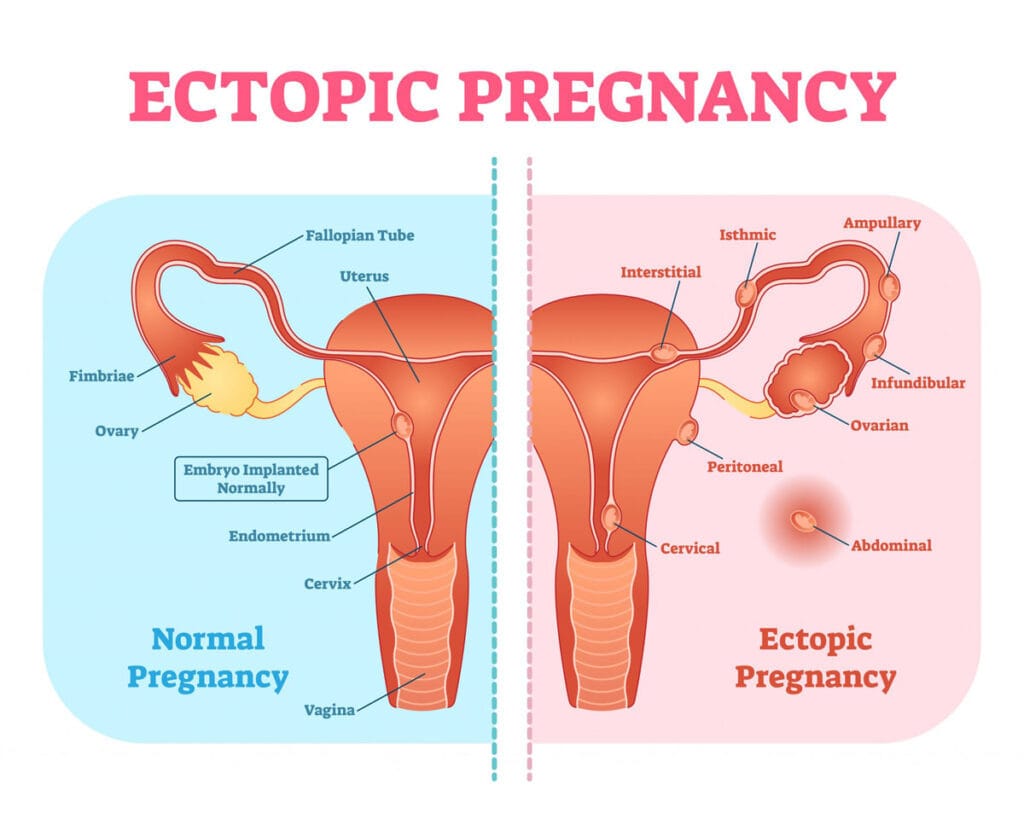Ectopic pregnancy is an abnormal case of pregnancy in which the fertilized egg does not grow in the uterus lining. Instead, it grows in the fallopian tubes, uterus horns, cervix or ovaries. To understand ectopic pregnancy in detail, we need to understand how a normal pregnancy occurs. Usually, the ovaries release eggs into the fallopian tubes; if the egg gets fertilized, it should move into the uterus, where the egg grows for the next 9 months. But this is not the case in an ectopic pregnancy as the fertilized egg remains in the fallopian tubes (tubal pregnancy), horns of the uterus (cornual pregnancy) or the cervix (cervical pregnancy). Tubal pregnancy is the most common ectopic pregnancy.
This type of pregnancy happens in 1 out of every 50 cases. Such pregnancies can’t continue normally and may cause damage to maternal structures. Although, in some cases of tubal pregnancy, there are highly slim chances that the child may survive. Ectopic pregnancies occur in the few weeks of the pregnancy, but doctors usually discover it by the 8th week. However, one can still have a normal and healthy pregnancy in future.
Below are the Ectopic Pregnancy Symptoms, Causes, Treatment, Diagnosis and Risk Factors.
CAUSES
The following are the causes of ectopic pregnancy:
- Unusually shaped fallopian tubes.
- Inflammation of fallopian tubes.
- Abnormal development of the fertilized egg.
- Hormonal imbalance.
RISK FACTORS
Previous Ectopic Pregnancy: If someone has had an ectopic pregnancy in the past, they are more likely to have another one compared to someone who has never had an ectopic pregnancy.
Unusually shaped fallopian tubes: Having abnormally shaped fallopian tubes increases the risk of an ectopic pregnancy.
Infection or inflammation: Infection of the uterus, ovaries or fallopian tubes can increase the risk of such type of pregnancy. These infections are generally a result of STDs such as Gonorrhea or Chlamydia. Inflammation of the fallopian tubes is also a risk factor.
Smoking: Smoking just days before getting pregnant adds to the chances of having an ectopic pregnancy.
SYMPTOMS
Initially, an ectopic pregnancy may or may not show any symptoms. Early signs of such a pregnancy might be similar to a normal pregnancy. For instance, you may experience vomiting, nausea, and periods of absence. The pregnancy test will be positive for an ectopic pregnancy, too. But sooner or later, you might experience symptoms which characterize an ectopic pregnancy:
Pain :
- Pain due to nausea and vomiting.
- Extreme abdominal cramps.
- Pain on one side of the patient’s body.
- Pain in one’s lower abdomen region, shoulder, neck, or rectum.
Symptoms involving bleeding :
- Light vaginal bleeding.
- Fainting due to blood loss & pain in cases where the fallopian tube raptures.
- Dizziness or weakness due to loss of blood.
DIAGNOSIS
If you or your doctor suspects that you have an ectopic pregnancy, then your doctor might perform a pelvic check-up, although, to ascertain such pregnancies, your doctor may suggest an ultrasound or blood test.
Ultrasound: A transvaginal ultrasound is required to ascertain an ectopic pregnancy. In such an ultrasound, the transducer is inserted into the patient’s vaginal opening, which results in producing an image of the required organs with the help of sound waves.
Blood tests: In certain cases it might be too early to confirm an ectopic pregnancy, hence, the doctor monitor the situation with help of some blood tests and then perform an ultra sound when the time is right.
MANAGEMENT AND TREATMENT
Depending on the condition of the fallopian tubes and the time of diagnosis, an appropriate method of treatment is selected to manage the ectopic pregnancy. An ectopic pregnancy cannot be continued as it will lead to life-threatening complications for the mother.
Medication and monitoring hCG levels: If the ectopic surgery is detected early, medication can be sufficient treatment. The aim of medication here is to stop the pregnancy tissues. Along with medication, the doctor will monitor levels of hCG (human chorionic gonadotropin), which are hormones produced during pregnancy. Medication should only be pursued if the fallopian tubes are still normal.
Laparoscopy: If the fallopian tubes are damaged, laparoscopy should be pursued. Laparoscopy is a procedure in which a small, lighted instrument known as the laparoscope is inserted through small incisions made near the abdomen area. The doctor will remove the embryo and also repair the damaged fallopian tubes.
Laparotomy: If there is a complete rupture of the fallopian tubes, then it is necessary to remove them. This is done by making a large incision near the abdomen. It is a procedure similar to laparoscopy, but since the incision is large, the recovery time, complications & pain are more.
Future pregnancy after treatment & management of ectopic pregnancy :
In most cases, normal pregnancies are possible after treatment of ectopic pregnancy. Even if one of your fallopian tubes was removed, normal pregnancy is still achievable through the other fallopian tube.
In most cases, normal pregnancies are possible after treatment of ectopic pregnancy. Even if one of your fallopian tubes was removed, normal pregnancy is still achievable through the other fallopian tube.
One must consult the doctor regarding how long to wait before pursuing another pregnancy. Usually, the time is 3-6 months.
Please fill out this form to book an Appointment.


